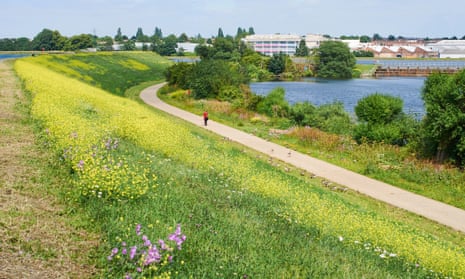The Labour party has pledged to introduce a Scottish-style right to roam law in England if it wins the next general election, with access to green space enshrined in law.
The shadow environment minister, Alex Sobel, made the announcement during a debate secured by the Green MP, Caroline Lucas, who has been campaigning for wider access to the countryside.
Only 8% of England has a right to roam, which covers coastal paths, mountains and moorland. Some private landowners, such as national trusts and some farmers, open their land and pathways for people to walk in and that is not included in the 8% figure.
In Scotland, there is a right to walk through the countryside, leaving no trace, with some exceptions such as not trampling over land that is growing crops. Under a Labour government, people in England would be granted the same rights.
The right to roam campaign has been gaining momentum, with thousands of people having taken part in mass trespasses last summer to demand more access to the countryside.
Sobel said: “Labour’s approach, like in Scotland, will be that Labour’s right to roam will offer access to high-quality green and blue space in the rest of Britain. We will replace the default of exclusion with a default of access.
“Research shows that people with a stronger connection to nature were more likely to behave positively towards the environment. It’s quite simple: the more people engage with nature, the more likely they are to protect it.”
He pointed out that access to nature was unfairly distributed in England, with people from minority ethnic groups and those in less affluent areas less likely to have accessible green space nearby.
“Labour will create a future where nature thrives, people have a deeper connection to the environment, and people have equal access to the benefits of green spaces,” the MP for Leeds North West added.
Jim McMahon, the shadow environment secretary, previously said that in government he would extend the right to roam but did not say a Scottish-style system would be in place.
He said in January: “There are still huge parts of England and Wales that are off-limits when it comes to the right to access, whether that’s woodlands, cliffs or rivers, where the rights that we are afforded in open countryside aren’t then mirrored in those places. That needs to change.”
after newsletter promotion
In response to Sobel, the environment minister, Trudy Harrison, did not commit to extending the right to roam, claiming many parts of the countryside were unsafe to roam on and adding that there were already 4,952 miles of available footpaths in England.
Lucas said she was asking for “not just more footpaths, not just more trails but an immersion in wild nature. People can’t do that right now as they are confronted by fences and barbed wires and ‘trespassers will be prosecuted’ notices.”
The Right to Roam campaign said: “Labour’s commitment to introduce, if elected, a new right to roam act – which would follow Scotland in replacing a ‘default of exclusion with a default of access’ – is extremely welcome.
“Scotland has had a right of responsible access to the majority of land for the last 20 years, with sensible exemptions and restrictions. It’s been very successful and it’s high time that the public in England were given the same opportunities to reconnect to nature and to care for it.”
